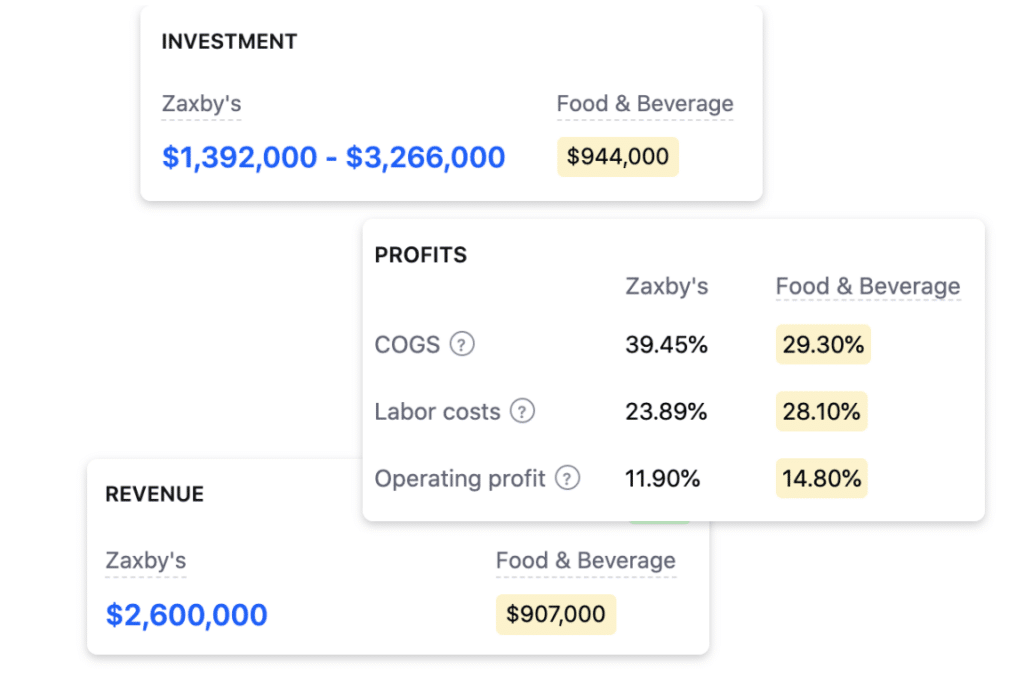
Mr. Transmission Franchise Costs $207K – $301K (+ 2024 Profits)
Here’s what you need to know if you’re interested in opening a Mr. Transmission franchise.

|
KEY FRANCHISEE INFORMATION
Here are the most important stats to know for franchisees.

NUMBER OF LOCATIONS

INITIAL INVESTMENT
$207,000 – $301,000

ROYALTY FEE

REVENUE PER YEAR
$812,000
Mr. Transmission is a well-established franchise specializing in transmission repair and drivetrain component services. Founded in 1956 and beginning its franchising operations in 1976, Mr. Transmission has grown to become the second-largest transmission franchise in the United States. The company is part of Moran Family of Brands and is known for its significant industry presence and expertise in the automotive repair sector.
Headquartered in Midlothian, Illinois, Mr. Transmission has built a reputation for providing high-quality service, which has been recognized through various industry awards and consistent rankings among the top automotive repair franchises by Entrepreneur Magazine and others.
The franchise offers a comprehensive range of services that extend beyond transmission repair to include clutch repair, drivetrain maintenance, and more. This broad service offering allows franchisees to cater to a wide range of customer needs, enhancing business potential.

Number of locations
Here’s how many Mr. Transmission there are in the US today.
| TOTAL UNITS 113 |
| FRANCHISED UNITS 111 |
Find the most profitable franchises on

Compare 1,000+ franchises and download unlimited FDDs
 | Mr. Transmission |
| FRANCHISE FEE | $40,000 |
| ROYALTY FEE | 3.5% to 8% |
| INITIAL INVESTMENT | $207,000 – $301,000 |
| AVERAGE REVENUE | $812,000 |


Initial investment
Here’s what you can expect to spend to start a Mr. Transmission franchise.
| Type of Expenditure | Amount |
|---|---|
| Single Unit Franchise Fee | $40,000 |
| Computer Software and Hardware Systems | $4,600 to $5,700 |
| VOIP Telephone Equipment Package | $900 |
| Initial Parts and Inventory | $3,800 to $4,500 |
| Furniture and Fixtures | $5,500 to $6,000 |
| Equipment | $65,000 to $79,000 |
| Shop Tools and Supplies | $3,000 to $4,000 |
| Signs | $8,000 to $17,200 |
| Initial Marketing Campaigns (First 6 months) | $30,000 |
| Displays and Marketing Materials | $4,800 |
| Warranty Fund Security Deposit | $5,000 |
| Leasehold Improvements/ Miscellaneous | $20,000 to $40,000 |
| Rental/Utility Deposits | $12,000 to $18,000 |
| Training Fee | $5,000 |
| Training Expenses | $1,500 to $2,500 |
| Mandatory Outside Sales Development Program | $3,000 |
| Additional Funds (6 months) | $36,500 to $57,500 |
| Total | $249,000 to $323,000 |
Note: The table above provides a snapshot of the main costs associated with starting the most common franchise format (as disclosed in the Item 7 of the Franchise Disclosure Document). For a complete overview of all the expenses involved with the various formats offered by the franchisor, please consult the Franchise Disclosure Document.

Franchise fees & Royalties
Here are the main ongoing fees the franchisor will ask you to pay going forward to run the franchise.
Initial Franchise Fee
The initial franchise fee for a Mr. Transmission Service Center or Milex Complete Auto Service Center is $40,000. For a Co-Branded Service Center, the fee is $50,000.
Royalty Fee
Franchisees must pay a royalty fee of 7% of weekly gross sales, or a minimum of $250 per week, whichever is greater.
Marketing/Advertising Fee
Franchisees are required to spend 3.5% of gross sales or a minimum of $1,500 per month on marketing and advertising, whichever is greater.
Technology Fee
The software subscription fee is currently $350 per month.
Transfer Fees
The transfer fee is $7,500.
Renewal Fees
The renewal fee for continuing the franchise agreement is $2,500.

Revenue & Profits
Here’s how much revenue and profits you can make with a Mr. Transmission franchise.
Find the most profitable franchises on

Compare 1,000+ franchises and download unlimited FDDs
 | Mr. Transmission |
| FRANCHISE FEE | $40,000 |
| ROYALTY FEE | 3.5% to 8% |
| INITIAL INVESTMENT | $207,000 – $301,000 |
| AVERAGE REVENUE | $812,000 |

Franchise pros and cons
The Pros:
- Comprehensive training: The franchisor offers its franchisees and auto technicians a detailed training program to equip them with the basics of its business concept, best operations, customer service, sales, technical support and back-shop support and facilitate the launch of their centers.
- Site selection and construction: Mr. Transmission helps its franchisees identify the right repair center location, negotiate their leases, design and develop their repair centers.
- Sales and customer care: The franchisor provides its franchisees with lead generation programs and training to assist them in building lasting relationships with the automotive communities in their local areas to benefit from referrals and improve their sales.
- Marketing and advertising: The franchisor helps its franchisees with marketing techniques such as ad templates, web development, email marketing, SEO, national media, regional advertising and local store promotional campaigns.
- Balanced work-lifestyle: The franchisor allows franchisees to plan their schedules, have time to spend with their loved ones and work on improving the performance of their ventures.
- Third-party financing: Mr. Transmission has relationships with third-party lenders to finance its franchise owners’ franchise fees, startup costs, equipment, inventory and payroll.
- Exclusive territory protection: The franchisor allows its franchisees to operate in an exclusive market area. As long as they comply with its franchise terms, the franchisor does not establish other franchises or operate competing businesses in the protected area.
- Co-branding with Milex Complete Auto Care: The franchisor allows its franchisees to co-brand with Milex Complete Auto Care, allowing them to offer a one-stop automotive experience to their customers, stand out from the competition and boost their earnings.
- Semi-absentee with a passive ownership opportunity: Mr Transmission gives franchisees the freedom to run a side business if they would prefer this.
The cons:
- Not a home-based opportunity: The Mr. Transmission franchise cannot be run from home or a vehicle. Franchisees must have an office space, warehouse or retail facility.
- Competition: These may include Certified Transmission, Fix Auto USA, Christian Brothers Automotive and AAMCO Transmission.
How to open
Opening a Mr. Transmission franchise involves several steps, designed to ensure you are a good fit for the franchise. Here are the main steps to follow to open a Mr. Transmission franchise.
1. Conduct Preliminary Research
- Learn about the Mr. Transmission franchise by visiting their official website and reviewing available resources.
- Understand the services offered, franchise business model, and market positioning.
2. Initial Inquiry
- Contact Mr. Transmission to express your interest in opening a franchise.
- Fill out any preliminary forms or applications available on their website to request more detailed information.
3. Review Franchise Disclosure Document (FDD)
- Obtain and carefully review the Franchise Disclosure Document (FDD) provided by Mr. Transmission.
- Consider consulting with a franchise attorney to help interpret the legal and financial details of the FDD.
4. Secure Financing
- Assess your financial capacity against the investment requirements outlined in the FDD.
- Explore financing options. Mr. Transmission may offer guidance on preferred lenders, including those offering SBA loans.
5. Site Selection and Approval
- Work with Mr. Transmission’s real estate team to identify a suitable location for your franchise based on demographics, traffic patterns, and competitive landscape.
- Finalize the site selection and get approval from the franchisor.
6. Sign Franchise Agreement
- Once your location is approved and financing is in place, you’ll sign the franchise agreement to formalize your commitment.
- Pay any required initial fees as outlined in the agreement.
7. Training and Support
- Participate in the comprehensive training program provided by Mr. Transmission. Training typically covers technical skills, customer service, operational procedures, and business management.
- Take advantage of ongoing support services which may include marketing, technical assistance, and business advisory.
Disclaimer
Disclaimer: This content has been made for informational and educational purposes only. We do not make any representation or warranties with respect to the accuracy, applicability, fitness, or completeness of the information presented in the article. You should not construe any such information or other material as legal, tax, investment, financial, or other professional advice. Nothing contained in this article constitutes a solicitation, recommendation, endorsement, advertisement, or offer to buy or sell any franchises, securities, or other financial instruments in this or in any other jurisdiction in which such solicitation or offer would be unlawful under the franchise and/or securities laws of such jurisdiction.
All content in this article is information of a general nature and does not address the detailed circumstances of any particular individual or entity. Nothing in the article constitutes professional and/or financial and/or legal advice, nor does any information in the article constitute a comprehensive or complete statement of the matters discussed or the law relating thereto. You alone assume the sole responsibility of evaluating the merits and risks associated with the use of any information or other content in this article before making any decisions based on such information or other content.
Interested in buying a Mr. Transmission franchise?
Download the financial plan built with the latest Franchise Document.



